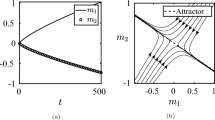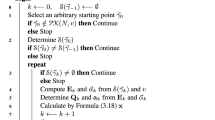Abstract
In this paper, we study macroeconomic stabilization in the Economic and Monetary Union(EMU) using a dynamic games approach. In modeling this problem, it turns out that theplayers include the time derivative of the state variable of the game in their performancecriterion. As far as the authors know, this kind of problem has not before been dealt withrigorously in dynamic games theoretic literature. Therefore, we first consider a generalizationof the linear‐quadratic differential game, in which we allow for cross terms in theperformance criteria. Following the analysis of Engwerda [10,12], we present formulas tocalculate open‐loop Nash equilibria for both the finite‐planning horizon and the infinite‐planninghorizon. Particular attention is paid to computational aspects. In the second part ofthis paper, we use the obtained theoretical results to study macroeconomic stabilization inthe Economic and Monetary Union (EMU).
Similar content being viewed by others
References
B. van Aarle, L. Bovenberg and M. Raith, Monetary and fiscal policy interaction and government debt stabilization, Journal of Economics 62(1995)111-140.
H. Abou-Kandil and P. Bertrand, Analytic solution for a class of linear-quadratic open-loop Nash games, International Journal of Control 43(1986)997-1002.
H. Abou-Kandil, G. Freiling and G. Jank, Necessary and sufficient conditions for constant solutions of coupled Riccati equations in Nash games, Systems & Control Letters 21(1993)295-306.
T. Başar and G.J. Olsder, Dynamic Noncooperative Game Theory, 2nd ed., Academic Press London, 1995.
M. Buti, D. Franco and H. Ongena, Budgetary policies during recessions. Retrospective application of the “Stability and Growth Pact” to the post-war period, European Commission Economic Papers no.121, Brussels, 1997.
E.J. Dockner, G. Feichtinger and S. Jørgensen, Tracktable classes of nonzero-sum open-loop Nash differential games, Journal of Optimization Theory and Applications 45(1985)179-197.
R. Dornbusch, Expectations and exchange rate dynamics, Journal of Political Economy 84(1976)1161-1176.
R.C. Douven and J.C. Engwerda, Is there room for convergence in the E.C.?, European Journal of Political Economy 11(1995)113-130.
T. Eisele, Nonexistence and nonuniqueness of open-loop equilibria in linear-quadratic differential games, Journal of Optimization Theory and Applications 37(1982)443-468.
J.C. Engwerda, On the open-loop Nash equilibrium in LQ-games, Journal of Economic Dynamics and Control 22(1998)729-762.
J.C. Engwerda, B. van Aarle and J.E.J. Plasmans, The infinite horizon open-loop Nash LQ game: An application to EMU, CentER Discussion Paper no. 9784, Tilburg University, 1997.
J.C. Engwerda, Computational aspects of the open-loop Nash equilibrium in linear quadratic games, Journal of Economic Dynamics and Control 22(1998)1487-1506.
C. Fershtman and I. Kamien, Dynamic duopolistic competition with sticky prices, Econometrica 55(1987)1151-1164.
M. Feucht, Linear-quadratische Differentialspiele und gekoppelte Riccatische Matrixdifferential-gleichungen, Ph.D. Thesis, Universität Ulm, 1994.
A. Haurie and G. Leitmann, On the global asymptotic stability of equilibrium solutions for open-loop differential games, Large Scale Systems 6(1984)107-122.
V. Kaitala, M. Pohjola and O. Tahvonen, Transboundary air polution and soil acidification: A dynamic analysis of an acid rain game between Finland and the USSR, Environmental and Resource Economics 2(1992)161-181.
P. Lancaster and M. Tismenetsky, The Theory of Matrices, Academic Press, London, 1985.
P. Levine and A. Brociner, Fiscal policy coordination and EMU: A dynamic game approach, Journal of Economic Dynamics and Control 18(1994)699-729.
D.L. Lukes and D.L. Russell, Linear-quadratic games, Journal of Mathematical Analysis and Applications 33(1971)96-123.
K.-G. Mäler, Critical loads and international environmental cooperation, in: Conflicts and Cooperation in Managing Environmental Resources, ed. R. Pethig, Springer, 1992.
H.-B. Meyer, The matrix equation AZ + B − ZCZ − ZD = 0, Siam Journal of Applied Mathematics 30(1976)136-142.
R. Neck and E.J. Dockner, Commitment and coordination in a dynamic game model of international economic policy-making, Open Economies Review 6(1995)5-28.
M.L. Petit, Fiscal and monetary policy co-ordination: A differential game approach, Journal of Applied Econometrics 4(1989)161-179.
M. Simaan and J.B. Cruz, Jr., 1973, On the solution of the open-loop Nash Riccati equations in linear-quadratic differential games, International Journal of Control 18(1973)57-63.
A.W. Starr and Y.C. Ho, Nonzero-sum differential games, Journal of Optimization Theory and Applications 3(1969)184-206.
G. Tabellini, Money, debt and deficits in a dynamic game, Journal of Economic Dynamics and Control 10(1986)427-442.
R. Tamborini, A stability pact for the EMU?, Working Paper No. 3, Department of Economics, University of Trento, 1997.
S.J. Turnovsky, Monetary and fiscal policy under perfect foresight: A symmetric two-country analysis, Economica 10(1986)139-157.
S.J. Turnovsky, T. Başar and V. d'Orey, Dynamic strategic monetary policies and coordination in interdependent economies, American Economic Review 81(1988)1443-1445.
A.J.T.M. Weeren, Coordination in hierarchical control, Ph.D. Thesis, Tilburg University, ISBN 90-5668-006-4, 1995.
A.J. de Zeeuw and F. van der Ploeg, Difference games and policy evaluation: A conceptual framework, Oxford Economic Papers 43(1991)612-636.
Rights and permissions
About this article
Cite this article
Engwerda, J., Aarle, B. & Plasmans, J. The (in)finite horizon open‐loop Nash LQ game:An application to EMU. Annals of Operations Research 88, 251–273 (1999). https://doi.org/10.1023/A:1018986514858
Issue Date:
DOI: https://doi.org/10.1023/A:1018986514858




